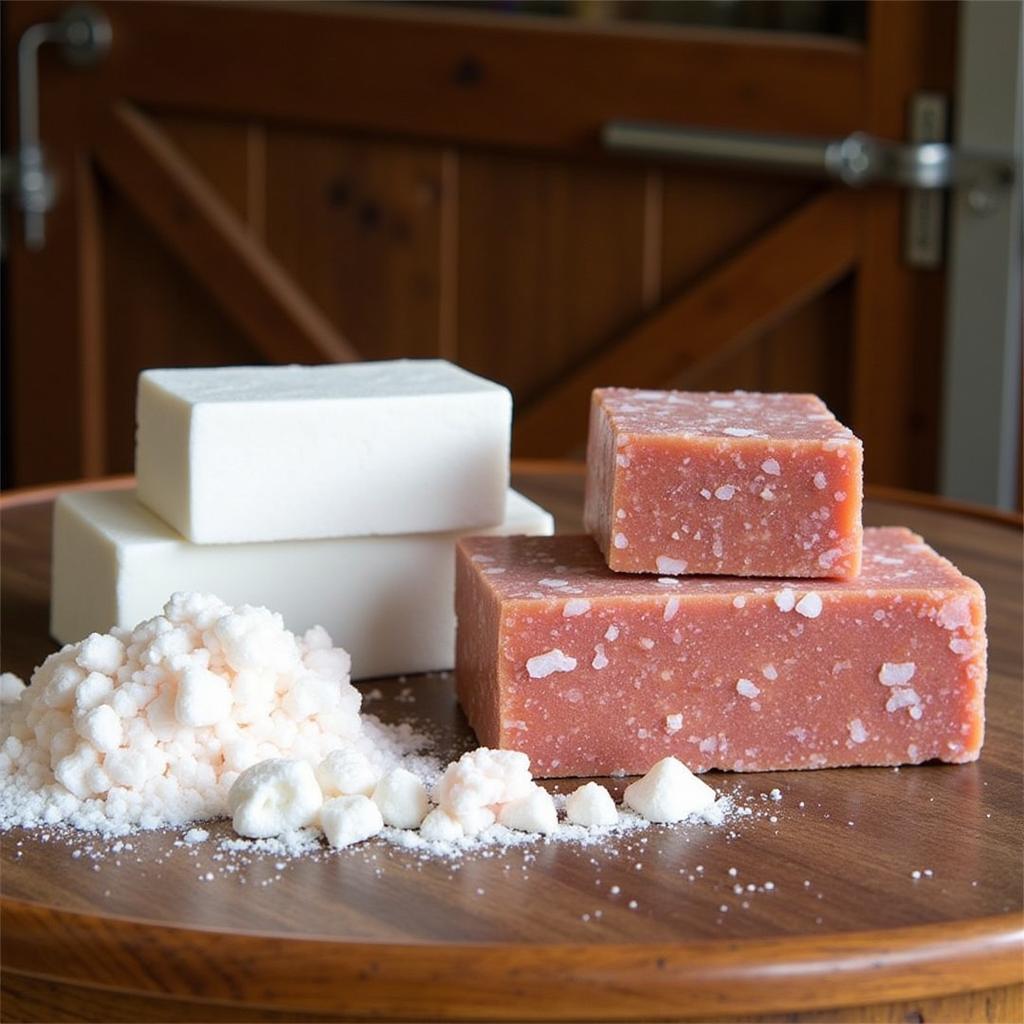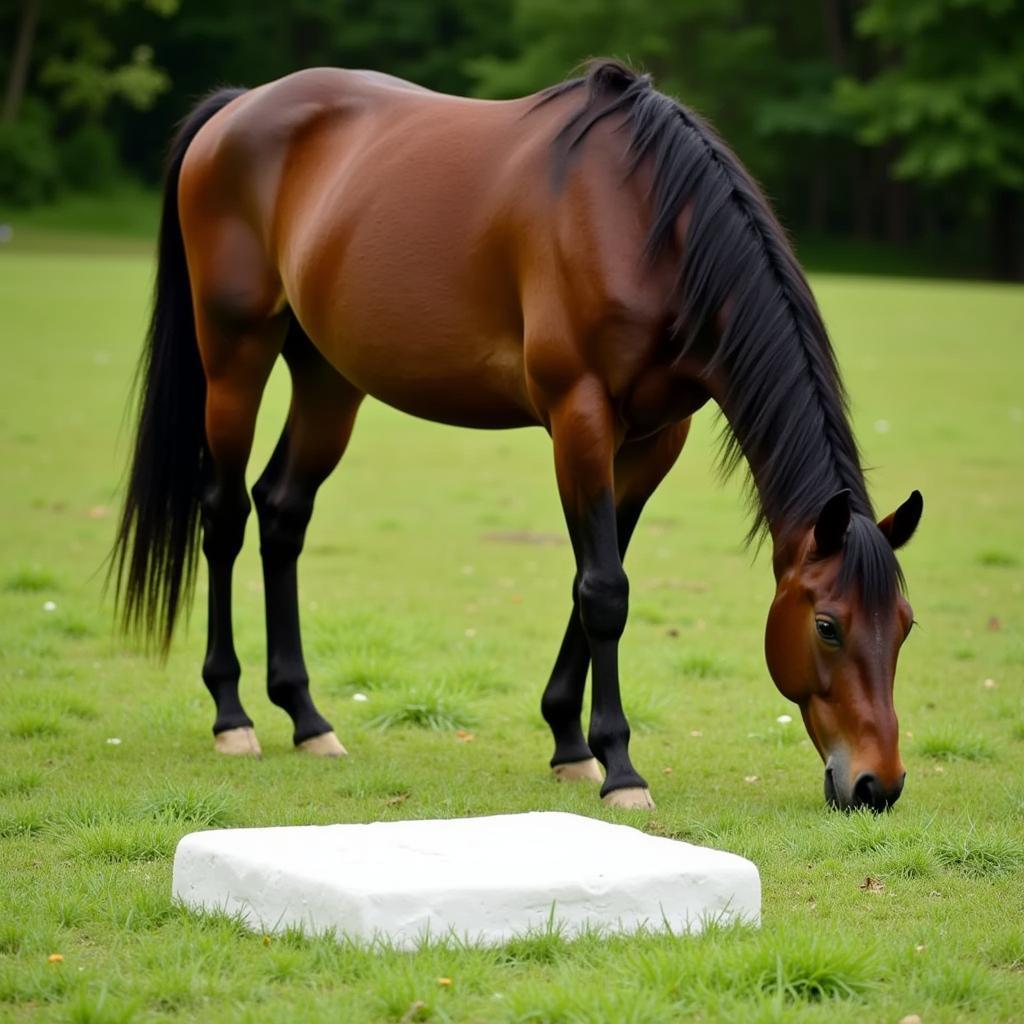Salt licks for horses are a common sight in pastures and stables. But have you ever stopped to think about why horses need them and what makes a good salt lick? Providing your horse with access to a salt lick is about more than just satisfying their craving for a salty treat – it’s about ensuring they receive vital minerals essential for their overall health and well-being.
Why Do Horses Need Salt Licks?
Horses, like all mammals, require a balanced diet to thrive, and minerals play a crucial role. While hay and forage provide a significant portion of their nutritional needs, they often lack adequate amounts of certain minerals, particularly sodium. This is where salt licks come in.
Horses lose sodium through sweat, especially during hot weather or strenuous activity. Sodium, along with other electrolytes, are essential for:
- Maintaining proper fluid balance
- Muscle function
- Nerve impulse transmission
- Digestion
A deficiency in sodium and other key minerals can lead to a variety of health issues, including:
- Dehydration
- Muscle weakness and cramping
- Poor performance
- Reduced appetite
- Rough hair coat
Types of Salt Licks for Horses
There are numerous types of salt licks available, each with its pros and cons. Choosing the right one depends on your horse’s individual needs and preferences.
White Salt Licks:
These are the most common and affordable type, made of pure, compressed salt. White salt licks provide horses with a readily available source of sodium.
Mineral Salt Licks:
These are fortified with additional minerals, such as calcium, phosphorus, and zinc. They are a great option for horses with known mineral deficiencies or those grazing on nutrient-poor pastures.
 Different Types of Salt Licks for Horses
Different Types of Salt Licks for Horses
Himalayan Salt Licks:
These pink-hued salt licks are becoming increasingly popular. They are a natural source of sodium and contain trace minerals believed to offer additional health benefits.
Choosing the Right Salt Lick for Your Horse
With so many options, how do you choose the right salt lick? Consider these factors:
- Your horse’s diet: If your horse receives a balanced diet with mineral supplements, a plain white salt lick might suffice.
- Mineral deficiencies: If your horse has a known mineral deficiency, opt for a mineral salt lick formulated to address that specific need.
- Preference: Some horses prefer the taste of certain salt licks over others. Observe your horse’s preferences and adjust accordingly.
Providing Salt Licks Safely
When offering salt licks, follow these tips:
- Location, Location, Location: Place salt licks in a clean, dry area of the pasture or stall that’s easily accessible.
- Fresh Water: Always ensure your horse has access to fresh, clean water, as salt intake will increase their thirst.
- Monitor Intake: While most horses self-regulate their salt intake, some might overindulge. Monitor their consumption and consult your veterinarian if you notice any unusual behavior.
Salt Licks vs. Salt Blocks
While often used interchangeably, “salt licks” and “salt blocks” have a subtle difference. Salt blocks for horses usually refer to larger, compressed blocks, while salt licks can encompass various forms, including loose salt.
Epsom Salt for Horses: A Different Kind of Salt
It’s important to note that Epsom salt, while containing the word “salt,” is not a suitable replacement for regular salt licks. Epsom salt is actually magnesium sulfate and serves different purposes. You can learn more about the benefits and uses of epsom salt poultice for horses in our detailed guide.
FAQs About Salt Licks for Horses
Do horses need salt licks year-round?
Yes, horses benefit from access to salt year-round. Their salt needs might increase during hotter months due to sweating.
Can horses have too much salt?
While rare, horses can consume too much salt. Overconsumption can lead to health problems, so it’s important to monitor their intake.
What are the signs of salt deficiency in horses?
Signs of salt deficiency can include decreased appetite, lethargy, dull coat, and licking or chewing on unusual objects.
Beyond Salt Licks: Ensuring a Balanced Diet
Salt licks are an essential component of a horse’s diet, but they don’t replace the need for a well-rounded feeding program. High-quality hay, fresh water, and mineral supplements, when necessary, are all crucial for maintaining your equine companion’s health and happiness.
 Healthy Horse Grazing in Pasture
Healthy Horse Grazing in Pasture
Need More Help?
Do you have questions about salt licks for horses or other aspects of equine care? We’re here to help! Contact us at:
- Phone: 0772127271
- Email: [email protected]
- Address: QGM2+WX2, Vị Trung, Vị Thuỷ, Hậu Giang, Việt Nam
Our dedicated team is available 24/7 to assist you with all your horse care needs.